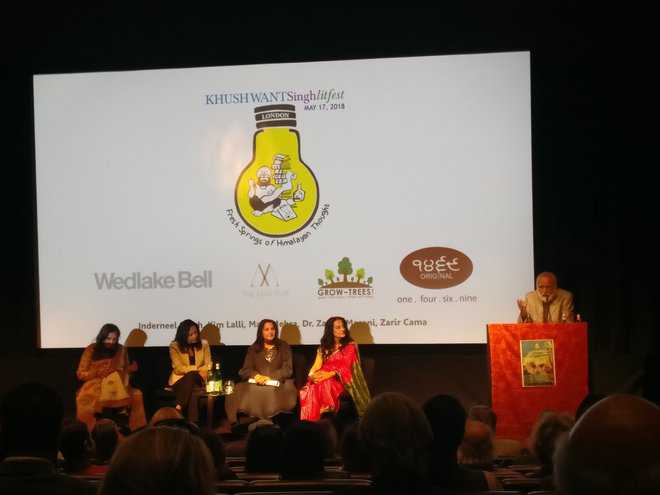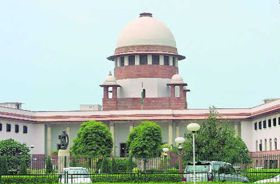
Celebrating the writer: (From left) Neelima Dalmia, Jaishree Misra, Imtiaz Dharker and Seema Anand pay tributes to the author
Hasan Suroor in London
With his characteristic penchant for self-deprecation, Khushwant Singh famously described himself as “not a nice man to know”, a phrase which he later chose as the title of his delightful memoirs.
So, he must have had a good chuckle if (from his perch in heaven) he were watching the proceedings at London’s plush May Fair hotel on Thursday (May 17) as his admirers lined up to gush about him declaring instead that he was “such a nice man to know”!
In a humorous take that Khushwant Singh would have approved of, poet Imtiaz Dharker said: “An ego-breaker, a whiskey-guzzler, a ghazal lover, he was not a nice man to know. I wish I had known him longer!” She said he was the first editor to publish her poetry at a time when young poets were struggling to get a foot in the door. How could he not be a “nice man”?
The occasion was the first London edition of the Khushwant Singh Literary Festival — a replica of the Kasauli KS Litfest held every year since his death six years ago.
“Kasauli comes to London,” declared his son Rahul Singh welcoming London’s literati to the day-long pop-up festival around the theme of “IndoAnglian” writing.
“Mind you, we’re deliberately spelling ‘IndoAnglian’ as one word with both ‘I’ and ‘A’ in capital letters to underline the close interaction between the two cultures,” he explained.
The theme was chosen to reflect the flavour of the ongoing “India-UK Year of Culture”.
Speaking to The Tribune, he said the festival was part of his efforts to preserve and promote his father’s legacy at a time when many of the values he cherished and espoused were being “challenged” by a culture of populism and philistinism. But why London?
“My father loved London. It was one of his most favourite European cities. He studied here and later served in the Indian High Commission as press attaché under Krishna Menon. He wasn’t very fond of him I’m afraid. He was something of an Anglophile and regarded England as his second home. He loved English poetry, and used to call English as his mother tongue which, of course, infuriated a lot of people. My father was also a big admirer of British values and its democracy.”
The idea to bring the festival to London had been brewing for three years when the then Indian High Commissioner Navtej Sarna, himself a writer and an ardent Khushwant Singh fan, offered to help with sponsorship. It was to be held at Nehru Centre.
“But then he went to Washington and at the last minute Nehru Centre pulled out. We were told they had another event the same day though we had decided on May 17 after consulting them. We had to suddenly look for another venue and that’s how we ended up at the May Fair,” said Rahul Singh.
But all’s well that ends well. Despite the last-minute flutter, it all came together in the end, said Niloufer Bilimoria, co-director of the festival. It was nearly full house with an impressive line-up of writers, academics and broadcasters — Pakistani novelist Moni Mohsin, historian Zareer Masani, British chronicler of the raj Charles Allen, Indologist Rachel Dwyer, and economist Meghnad Desai among others.
Organisers were keen to make a distinction between KS Litfest and other literary festivals pointing out that unlike others, it was more focused. And the focus was on a few specific areas that were of particular interest to Khushwant Singh such as women’s empowerment, environment, rise of nationalism, India’s ancient heritage, and India-Pakistan relations.
The opening session was, perhaps, the most interesting with four famous women writers (Imtiaz Dharker, Jaishree Misra, Seema Anand, and Neelima Dalmia) mentored by Khushwant Singh recalling their memories of him. And the role he played in shaping their career. They described him as a larger-than-life figure —humorous, provocative, and unpretentious with an extraordinary capacity to laugh at himself. Often, he did things simply to shock people.
“He wrote his own obituary...and that was some 40 years before his death! He wanted to contest the notion that an obituary was only about dead people,” said Rahul Singh.
According to Neelima Dalmia, he “broke all rules of men and God”.
“He told me he loved to receive more hate mail than fan mail.”
The verdict at the end of the day was that it was hard to think of another modern Indian writer whose appeal and popularity cut across such a large cross-section of readership as Khushwant Singh’s.
“He was admired not only in India, but across the border in Pakistan,” said Charles Allen.
As the festival wound up, it was not clear whether it was a one-off event, or is it likely to become an annual feature of London’s literary calendar. “Certainly, not a one-off, but let’s see,” was the message from organisers.



























